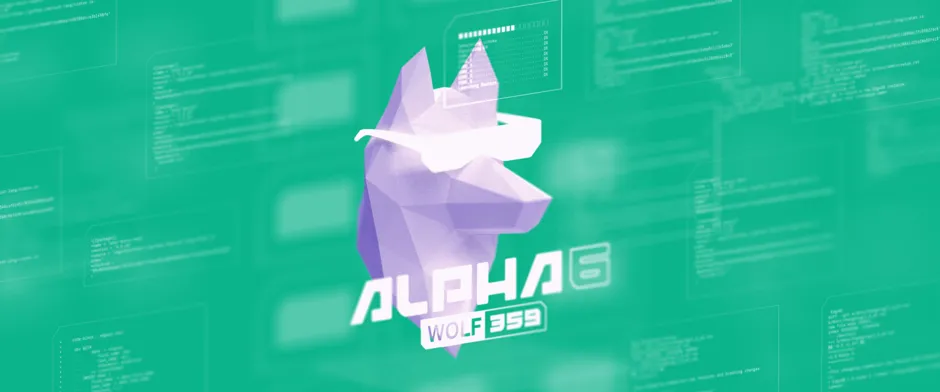Looking at another nearby star, Wolf 359, we’re pleased to release the sixth and final alpha release of EdgeDB 1.0. Yes, we’re getting close to the public beta!
In the meantime, you can download 1.0a6 in a number of ways or try it out in our interactive tutorial without the need to install anything.
This release focuses on polishing EdgeQL, the query language that’s one of the main reasons we believe we’re on the path to a 10X database.
What’s EdgeDB
EdgeDB is an advanced open source relational database based on PostgreSQL. The project aims to give developers and data engineers a highly efficient and productive database technology while addressing the shortcomings of SQL and its surrounding ecosystem:
-
high-level data model and type system;
-
a powerful, expressive and extensible query language that allows working with complex data relationships easily;
-
first-class support for schema migrations;
-
support for converting arbitrary strictly typed data to and from JSON via a simple cast operator;
-
out-of-the-box interoperability via REST and GraphQL.
Improved UPDATE
Coalescing inside UPDATE queries is now allowed. This is useful for
complex self-referencing sets. For example, let’s imagine a tree node:
type Tree {
required property val -> str {
constraint exclusive;
}
link parent -> Tree;
multi link children := .<parent[IS Tree];
}We can fill a database with trees now for example with data like:
# Root node
INSERT Tree {val := '0'};
# First-level children
INSERT Tree {
val := '00', parent := (SELECT DETACHED Tree FILTER .val = '0')};
INSERT Tree {
val := '01', parent := (SELECT DETACHED Tree FILTER .val = '0')};
INSERT Tree {
val := '02', parent := (SELECT DETACHED Tree FILTER .val = '0')};
# Second-level children
INSERT Tree {
val := '000', parent := (SELECT DETACHED Tree FILTER .val = '00')};
INSERT Tree {
val := '010', parent := (SELECT DETACHED Tree FILTER .val = '01')};
# Another tree's root node
INSERT Tree {val := '1'};
# First-level children of the other tree
INSERT Tree {
val := '10', parent := (SELECT DETACHED Tree FILTER .val = '1')};
INSERT Tree {
val := '11', parent := (SELECT DETACHED Tree FILTER .val = '1')};Now, with the new UPDATE statement we can transform values of all
nodes, including the root node, with a single query like:
UPDATE Tree
SET {
val := .val ++ '_p' ++ (('_' ++ .parent.val) ?? '')
};This query adds the parent’s value to the child, resulting in our data transformed to:
[
{
'val': '0_p',
'children': [
{
'val': '00_p_0',
'children': [{'val': '000_p_00', 'children': []}]
},
{
'val': '01_p_0',
'children': [{'val': '010_p_00', 'children': []}]
},
{
'val': '02_p_0',
'children': []
}
]
},
{
'val': '1_p',
'children': [
{
'val': '10_p_1',
'children': []
},
{
'val': '11_p_1',
'children': []
}
]
}
]If you’re wondering how we got from EdgeDB objects to JSON, it’s because
our clients natively support returning JSON from a query.
Better constraints
The expression transformer became more powerful, allowing usage of
the EXISTS operator inside constraint expressions. For example:
CREATE TYPE Node {
CREATE LINK child -> Child {
# emulating "required"
CREATE CONSTRAINT expression ON (EXISTS __subject__)
}
};Partial paths are now also allowed in constraint expressions. For example:
CREATE TYPE Vector {
CREATE PROPERTY x -> float64;
CREATE PROPERTY y -> float64;
CREATE CONSTRAINT expression ON (
.x^2 + .y^2 < 25
);
};More powerful functions
EdgeDB now supports a shorthand syntax for EdgeQL functions:
function area(shape: Circle)
-> float64 using (3.1415 * shape.radius ^ 2);This could be achieved with an intermediate SELECT before which was
more verbose:
function area(shape: Circle)
-> float64
from edgeql $$
SELECT 3.1415 * shape.radius ^ 2
$$;New enum syntax
In previous releases you could define enumerations like this:
scalar type Color extending enum<'red', 'green', 'blue'>;This allowed arbitrary strings as enum values. We are deprecating this in favor of a new syntax using regular identifiers like:
scalar type Color extending enum<Red, Green, Blue>;This will allow us in a future release to adopt a more natural (and less verbose!) syntax for referring to an enum value like:
SELECT schema::Cardinality.ONE;instead of the current:
SELECT <schema::Cardinality>'ONE';Improve RTL text handling
We noticed that the names of some standard functions was misleading when used with right-to-left text. We decided to rename them as follows for clarity:
|
Old name |
New name |
|---|---|
|
| |
|
| |
|
| |
|
|
Predictable DML
There are some limitations to using the Data Manipulation Language
(INSERT, DELETE, or UPDATE) statements as part of other
expressions. For example, they cannot appear in conditionals, such as
?? and IF as they would be executed regardless of the conditional
expression’s state.
Function calls are another interesting case. They can be optimized out by the query planner, leading to undefined behavior if volatile functions were to contain DML statements.
The safe thing here is to also disallow this behavior and this is the plan. However, since that would break existing users, we are now working on a way to selectively enable DML in functions. We laid the mechanisms to enable prohibition but there’s no enforcement yet in this release.
Finally, DML statements cannot be correlated with other query components,
basically they must always be independent of the rest of the query in such a
way that refactoring them into a WITH block doesn’t change the semantics.
We’ve been disallowing this for a while but this release brings several
improvements to it.
CLI improvements
EdgeQL changes are not the only area of improvement this time. The CLI interface learned a few handy tricks! First and foremost, you can now install EdgeDB in a Docker container straight from the CLI with:
$ edgedb server install --method=dockerThe CLI is now also able to upgrade itself. To allow this, it performs a network check to see if it’s the newest version.
Finally, on the server-side, initializing databases was also improved with
the newly added --bootstrap-script and --bootstrap-command arguments
that allow the server to run commands straight after database bootstrap.
Summary
As usual, the change log provides a detailed story of the changes in this release.
If you have any questions, feel free to join the conversation on GitHub Discussions, or ask in form of a bug report or a feature request.
For future announcements, you can find us on Twitter.


